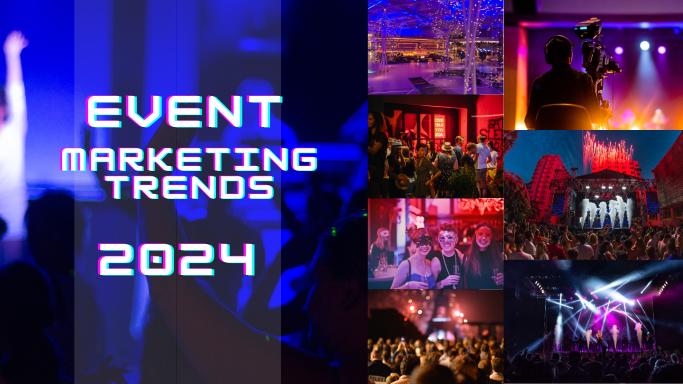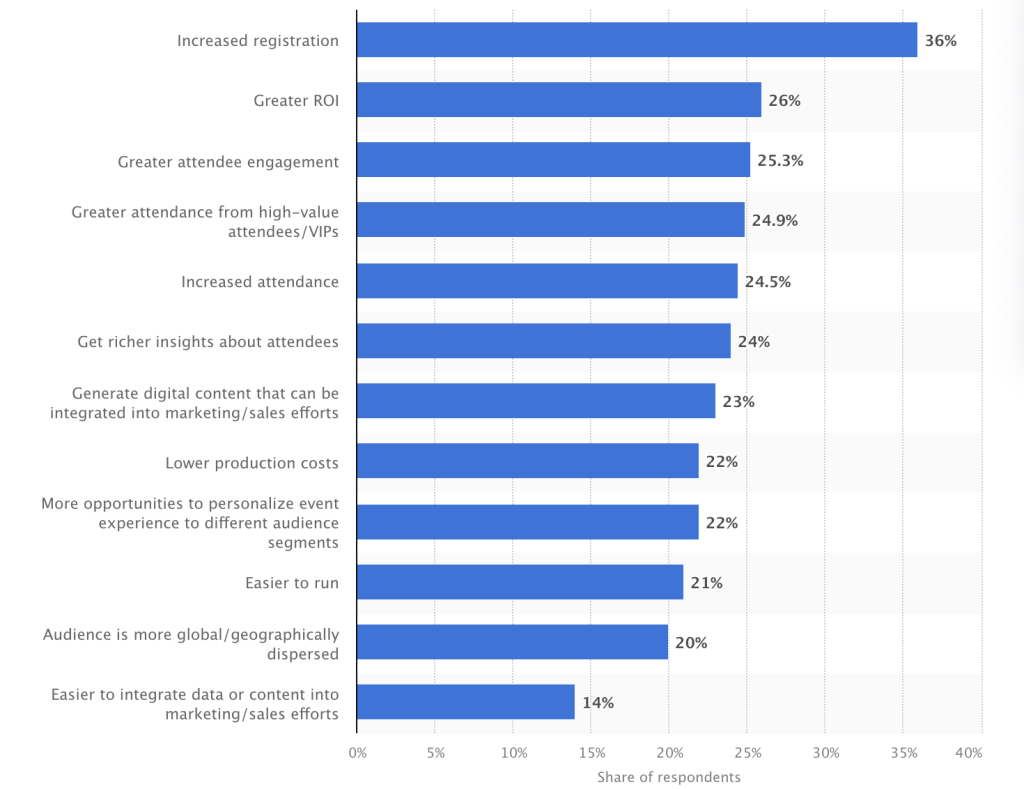Spotlight on Event Management Trends: How Top Event Agencies Stay Ahead of their Rivals
Events have always been a crucial aspect of our lives, bringing people together to celebrate, learn, and connect. With the ever-evolving demands and expectations of attendees, event management has continuously evolved to keep up with the times. In this article, we will explore the top event management trends of today that are shaping the way events are planned and executed. Additionally, we will delve into the emerging event marketing trends that are revolutionizing promotional strategies for these events.

Why are events management trends evolving rapidly?
Now, more than ever, interests and information are in a constant state of evolution. What was once considered commonplace becomes outdated as new words and concepts, like the FOMO factor, emerge. It’s not surprising that an industry rooted in people’s interests would need to swiftly adapt to these changes.
Furthermore, with the emergence of new areas of interest, entertainment, and technology, the events industry must keep pace to continue bringing people together. The audience has grown more demanding, and they aren’t interested in events lacking proper planning, information, and adequate space.
Event professionals are esteemed for their expertise in organizing large-scale events. They are increasingly involved in various aspects of business, including marketing and sales. What was once merely a part of entertainment and product sales has now evolved into an entire industry with its own trends and technologies.

Top event management trends that propel firms into competitive spheres
1. Immersive Experiences: Going Beyond Traditional Event Formats
Gone are the days when events followed the traditional conference-style format. Nowadays, event organizers aim to create immersive experiences that captivate attendees from the moment they step in. This trend involves incorporating various elements, such as interactive exhibits, themed environments, and multi-sensory activities, to engage the senses and leave a lasting impact. The goal is to transport attendees to a different world, allowing them to fully immerse themselves in the event’s theme or purpose.
2. AI-Powered Technology: Optimizing Event Planning and Management
Artificial intelligence (AI) has revolutionized event management trends by simplifying and streamlining various processes. From chatbots that provide instant event information to predictive analytics that aid in forecasting attendance, AI-powered technology has become an invaluable tool for event planners. With the ability to automate tasks and analyze large sets of data, event professionals can now focus more on strategic planning and enhancing attendee experiences.
3. Sustainability: Embracing Eco-Friendly Practices
Environmental concerns have permeated almost every industry, and event management trends are no exception. In recent years, there has been a substantial shift towards organizing sustainable events that minimize their environmental footprint. Event planners are adopting eco-friendly practices such as reducing waste, sourcing locally produced goods, and implementing energy-efficient technologies. By prioritizing sustainability, events not only contribute to a greener future but also inspire attendees to incorporate environmentally conscious habits into their own lives.
4. Inclusive and Diverse Event Experiences
Diversity and inclusivity have emerged as significant factors in event management trends. Organizers are now focused on creating inclusive environments that cater to attendees from different backgrounds, abilities, and identities. This trend involves considering diverse perspectives during event planning, providing accessible facilities and services, and promoting diverse voices and talent. By embracing inclusivity, events become more welcoming and enriching for all attendees, leading to a more vibrant and interconnected community.
5. Creative Venue Selection: Exploring Unconventional Spaces
Finding unique and appealing venues has become a priority for event organizers seeking to stand out from the crowd. Instead of traditional event venues, such as hotels or convention centers, creative professionals are now exploring unconventional spaces. Abandoned warehouses, art galleries, rooftop gardens, and even historical landmarks are being repurposed as event spaces. These distinctive venues provide attendees with memorable experiences while also allowing organizers to showcase their creativity and originality.
Types of Event marketing trends that experience Rapid Growth

1. Influencer Marketing: Leveraging Social Media Power
In today’s digital age, social media platforms have become vital resources for event promotion. Event marketing now involves collaborating with influencers who have a significant following and influence in specific niches. By partnering with relevant influencers, event organizers can leverage their reach, credibility, and engagement to increase event awareness and ticket sales. Influencer marketing allows events to tap into a highly targeted audience and generate buzz in a more organic and authentic manner.
2. Virtual and Hybrid Events: Embracing Digital Platforms
Virtual and hybrid events have gained immense popularity in recent times, primarily due to the global pandemic. These events allow attendees to participate remotely, eliminating geographical limitations and expanding the reach of an event. Virtual events can include live-streamed sessions, interactive Q&A sessions, and virtual networking opportunities. Hybrid events combine in-person and virtual elements, offering a dynamic experience for both physical and virtual attendees. This trend has revolutionized event marketing by providing flexibility and accessibility to a wider audience.
3. Data-Driven Strategies: Personalization and Targeted Marketing
Data has become a powerful tool for event marketers seeking to create personalized and targeted campaigns. By analyzing attendee data, event organizers can gain insights into preferences, behaviors, and demographics, allowing them to tailor marketing efforts accordingly. This data-driven approach enables event marketers to deliver personalized experiences, customized content, and targeted advertising campaigns. By understanding their audience on a deeper level, event organizers can optimize their promotional strategies and enhance attendee engagement.
4. Storytelling: Captivating Audiences through Compelling Narratives
Storytelling has always been a fundamental aspect of human communication, and it has found its place in event marketing as well. Events with compelling narratives woven into their promotions tend to attract and captivate audiences more effectively. By creating a compelling storyline that evokes emotions and curiosity, event marketers can generate excitement, anticipation, and a sense of connection among potential attendees. Storytelling adds a personal touch to event promotions and creates a memorable experience even before the event takes place.
5. Interactive Content: Engaging Attendees Pre-, During, and Post-Event
Interactive content has become a crucial part of event marketing, allowing organizers to engage with attendees at every stage of the event journey. From pre-event quizzes and surveys to live polls and social media contests during the event, interactive content encourages active participation and generates buzz. Post-event, interactive content can involve sharing attendee stories, showcasing event highlights, and soliciting feedback. By creating opportunities for meaningful engagement, event marketers can create a sense of community and cultivate long-term relationships with attendees.
In conclusion, event management trends are constantly evolving, and staying up-to-date with the latest trends is vital for success. Embracing immersive experiences, AI-powered technology, sustainability, inclusivity, creative venue selection, influencer marketing, virtual and hybrid events, data-driven strategies, storytelling, and interactive content can empower event organizers to create impactful and memorable events that exceed attendee expectations. Event marketing trends such as influencer collaborations, virtual experiences, data-driven strategies, storytelling, and interactive content provide opportunities to engage and connect with audiences on a deeper level, ensuring the success of your event. Here is the graph showing the benefits of virtual events.

Why have virtual events gained immense popularity out of all the trends in recent times?
1. Enhancing Attendance, Interaction, and Engagement through Virtual Events
Wondering about the merits of virtual events? Delve into the 4 event marketing trends we’ve outlined below. You’ll be fascinated by the myriad features it offers within budget constraints and limited resources.
Virtual events, distinct from traditional in-person gatherings, elevate attendance and create a more captivating experience. By eliminating the necessity for travel and providing a flexible event schedule, virtual events simplify participation, especially for those hindered by logistical challenges.
Online events frequently incorporate interactive features, facilitating dynamic sessions. Encourage attendees to actively engage with content through chat rooms, opinion surveys, and Q&A sessions. Breakout rooms foster smaller-group discussions, promoting networking and collaboration. Virtual Q&A sessions excel, allowing easy notation of questions without the background noise typical of traditional on-site events.
Implementation and management of activities become more seamless, allowing attendees to connect with presenters and peers, elevating overall event engagement.
Moreover, virtual events open avenues for attendees to interact with sponsors and exhibitors through virtual booths, online product showcases, and demonstrations, expanding event reach and visibility and potentially unlocking new business opportunities and heightened brand awareness.
2. Extended Reach and Diverse Audience Appeal
Virtual events transcend the limitations of traditional in-person gatherings, reaching a broader audience. Hosting virtual events enables connections with people worldwide, breaking the confines of geographical boundaries.
Additionally, virtual events empower attendees to share content on social media, amplifying event reach through online advertising for a more extensive audience. This inclusive approach targets specific audiences, potential stakeholders, and customers, fostering valuable business relationships and sponsorship opportunities.
The accessibility of virtual events to individuals from diverse geographic regions, backgrounds, and cultures contributes to a more inclusive and varied community. This diversity enriches the event with a spectrum of perspectives and ideas.
3. Enhanced ROI as a Key Advantage of Virtual Events
Virtual events yield a superior return on investment (ROI) compared to their traditional on-site counterparts. With minimal expenditure and the ability to reach a larger audience without the burden of costly travel, catering, and accommodation, virtual events offer numerous advantages, streamlining event management through registration software.
Consider the costs involved in organizing traditional in-person events—venue, catering, equipment, furniture, electricity, and security. Virtual events, supported by the right registration software, boast lower registration fees, ensuring increased accessibility for attendees. This accessibility, in turn, boosts attendance, enhancing the overall ROI.
In a survey, 74% of event planners reported a favorable ROI within six months of transitioning to virtual events. Organizers appreciate the simplicity and efficiency of achieving business objectives through virtual platforms.
Moreover, virtual events present a promising ROI for sponsors and exhibitors, increasing the likelihood of B2B matchmaking based on shared objectives and ideas.
4. Amplifying Attendance, Interaction, and Engagement in Virtual Events
Contrasting with traditional in-person events, virtual gatherings excel in enhancing attendance and delivering a more immersive experience. By eliminating travel requirements and offering a flexible event schedule, virtual events cater to attendees who may face logistical challenges.
Interactive features in online events facilitate engaging sessions. Attendees can actively participate through chat rooms, opinion surveys, and Q&A sessions. Breakout rooms foster smaller group discussions, aiding networking and collaboration. Virtual Q&A sessions shine by allowing easy note-taking without the background noise prevalent in traditional events.
Implementing and managing activities becomes more straightforward, encouraging interaction among attendees and presenters and elevating overall event engagement.
Furthermore, virtual events create opportunities for attendees to connect with sponsors and exhibitors through virtual booths, online product showcases, and demonstrations. This not only broadens event reach and visibility but also opens doors to potential business opportunities and heightened brand awareness.

How to Embrace the Event Trends of 2024?
Numerous event organizers and brands are already adapting to these changes. Some are still getting acquainted with them, while others are ahead of the curve. To expedite this process, you can always rely on technology to help you leverage these event trends more swiftly.
Our timely event software solutions are designed to assist you. They provide not just an event listing system for your website but also robust event management software. Equipped with all the necessary tools, it enables you to initiate event planning, promote it online, handle payments, manage attendee lists, and even process refunds with just a few clicks.
In addition to maintaining the highest standards of information security and controls, our event management system complies with all major global privacy laws. Furthermore, it is fully accessible, enhancing event SEO and improving how your attendees navigate through your online event calendar.
For those looking to capitalize on the latest trends in the event industry, Floodlightz is here to support you.
Get in touch with us to discover more about our remarkable features and how we can enhance your event management experience.
Event Management Trends | Top Event Management Trends |



0 Comments